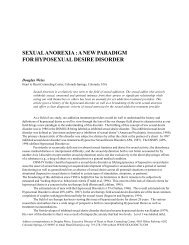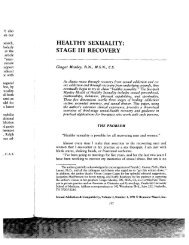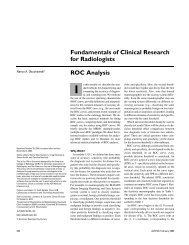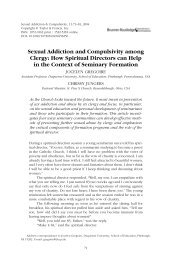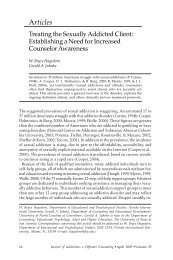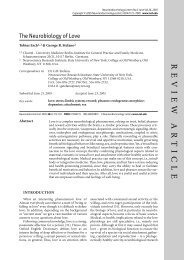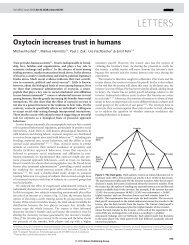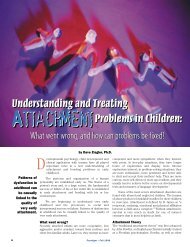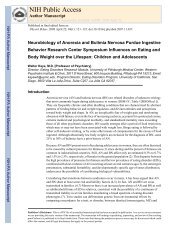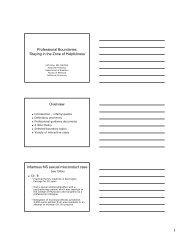An Overview of Psychiatric Ethics
An Overview of Psychiatric Ethics
An Overview of Psychiatric Ethics
Create successful ePaper yourself
Turn your PDF publications into a flip-book with our unique Google optimized e-Paper software.
In current medical practice most diagnostic, therapeutic or prophylactic procedures involve hazards.This applies especially to biomedical research.Medical progress is based on research which ultimately must rest in part on experimentationinvolving human subjects. In the field <strong>of</strong> biomedical research a fundamental distinction must berecognised between medical research in which the aim is essentially diagnostic or therapeutic for apatient, and medical research the essential object <strong>of</strong> which is purely scientific and without implyingdirect diagnostic or therapeutic value to the person subjected to the research.Special caution must be exercised in the conduct <strong>of</strong> research which may affect the environment,and the welfare <strong>of</strong> animals used for research must be respected.Because it is essential that the results <strong>of</strong> laboratory experiments be applied to human beings t<strong>of</strong>urther scientific knowledge and to help suffering humanity, the World Medical Association hasprepared the following recommendations as a guide to every physician in biomedical researchinvolving human subjects. They should be kept under review in the future. It must be stressed thatthe standards as drafted are only a guide to physicians all over the world. Physicians are not relievedfrom criminal, civil and ethical responsibilities under the law <strong>of</strong> their own countries.63I. Basic Principles1. Biomedical research involving human subjects must conform to generally accepted scientificprinciples and should be based on adequately performed laboratory and animal experimentationand on a thorough knowledge <strong>of</strong> the scientific literature.2. The design and performance <strong>of</strong> each experimental procedure involving human subjects shouldbe clearly formulated in an experimental protocol which should be transmitted to a speciallyappointed independent committee for consideration, comment and guidance.3. Biomedical research involving human subjects should be conducted only by scientificallyqualified persons and under the supervision <strong>of</strong> a clinically competent medical person. Theresponsibility for the human subject must always rest with a medically qualified person and neverrest on the subject <strong>of</strong> the research, even though the subject has given his or her consent.4. Biomedical research involving human subjects cannot legitimately be carried out unless theimportance <strong>of</strong> the objective is in proportion to the inherent risk to the subject.5. Every biomedical research project involving human subjects should be preceded by carefulassessment <strong>of</strong> predictable risks in comparison with foreseeable benefits to the subject or toothers. Concern for the interests <strong>of</strong> the subject must always prevail over the interests <strong>of</strong> scienceand society.6. The right <strong>of</strong> the research subject to safeguard his or her integrity must always be respected.Every precaution should be taken to respect the privacy <strong>of</strong> the subject and to minimize theimpact <strong>of</strong> the study on the subject’s physical and mental integrity and on the personality <strong>of</strong> thesubject.7. Physicians should abstain from engaging in research projects involving human subjects unlessthey are satisfied that the hazards involved are believed to be predictable. Physicians shouldcease any investigation if the hazards are found to outweigh the potential benefits.8. In publication <strong>of</strong> the results <strong>of</strong> his or her research, the physician is obliged to preserve theaccuracy <strong>of</strong> the results. Reports <strong>of</strong> experimentation not in accordance with the principles laiddown in this Declaration should not be accepted for publication.9. In any research on human beings, each potential subject must be adequately informed <strong>of</strong> theaims, methods, anticipated benefits and potential hazards <strong>of</strong> the study and the discomfort itmay entail. He or she should be informed that he or she is at liberty to abstain from participationin the study and that he or she is free to withdraw his or her consent to participation at anytime. The physician should then obtain the subject’s freely given informed consent, preferably inwriting.IMET AN OVERVIEW OF PSYCHIATRIC ETHICS



